
Dear Friends,
This past week, priests and deacons from across the Diocese went on retreat to Trent University in Peterborough for our annual Clergy Conference. All of us were blessed by the teaching of Dr. Betty Pries, who spoke to us on the topics of navigating change and having difficult conversations. The greatest blessing, of course, was taking time apart as colleagues in ministry, for prayer and worship, sharing and laughter, rest and restoration. It was a wonderful time of learning and mutual support, and for me personally, a tonic. But of course, coming home again is always sweet.
As I think ahead to this Sunday – Refugee Sunday – I am conscious, however, of people who leave home, never expecting to return. What happens if you’re forced to leave your country suddenly, with next to nothing? What if you have to uproot your family? What if your children have never known a safe home? What happens when the only place you can find safety is half a world away, with a different language, customs and societal structures?
More people are experiencing displacement now than at any time in recorded history: the UN High Commission on Refugees estimates that 110 million people were forcibly displaced by the middle of 2023. Of these, 36.4 million are refugees, people who have left their home country and cannot return due to a well-founded fear of persecution on the grounds of race, religion, nationality, political opinion, or membership in a particular social group. Nearly 2 million of them have never known their home country, having been born as refugees.
Most refugees find temporary shelter in neighbouring countries, where they live in a state of limbo, without access to the rights and opportunities of other citizens. For them, the only durable solution is to make a new home in another country. Yet this brings with it its own host of challenges.
In Canada, we have a unique opportunity to be part of the refugee resettlement process through the Private Sponsorship of Refugees Program. Faith groups are among the hundreds of organizations holding sponsorship agreements with the federal government, by which they commit to providing for a refugee individual or family for their first year in Canada. Fifteen dioceses in the Anglican Church of Canada, including ours, are sponsorship agreement holders, enabling their parishes to take part in this life-giving work. Here in the Diocese of Toronto, we are fortunate to have the expertise of our ministry partner, the Anglican-United Refugee Alliance (AURA), which works closely with parishes to guide and support them through the sponsorship process.
World Refugee Day falls on June 20. For the past three years, our Diocese has set aside a Sunday leading up to that date to lift up the needs of refugees worldwide and to invite parishes to consider refugee sponsorship. We will continue to hold the first Sunday in June as Refugee Sunday.
Building on the materials produced by our Diocese and AURA in past years, the Primate’s World Relief and Development Fund (PWRDF) has compiled resources for parishes to host their own celebration of Refugee Sunday. You can find them at pwrdf.org/refugee-sunday. You can also invite a member of AURA’s board or of your own parish’s sponsorship committee to speak about what participating in refugee sponsorship means to them. I can tell you from personal experience, sponsoring refugees is transformative for everyone involved.
Jesus Himself had to flee persecution as an infant, when his family made their way to Egypt to escape King Herod. “I was a stranger, and you welcomed me,” he taught. In opening our hearts and communities to refugees, we are, in a very tangible way, helping them to exchange displacement and terror for safety and home, helping to heal our human family. And in welcoming refugees, we are welcoming Jesus Himself.
Yours in Christ,
The Rt. Rev. Andrew Asbil
Bishop of Toronto